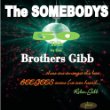All but the most rabid disco haters will acknowledge the unfairness of focusing obsessively on a four-year period of music while ignoring the group's entire body of work created during a 50-year career. I wouldn't be surprised if many Bee Gee bashers were conceived or conceived their children while listening to Al Green's version of "How Do You Mend A Broken Heart," a song the Bee Gees wrote and took to number one in 1971.
All but the most rabid disco haters will acknowledge the unfairness of focusing obsessively on a four-year period of music while ignoring the group's entire body of work created during a 50-year career. I wouldn't be surprised if many Bee Gee bashers were conceived or conceived their children while listening to Al Green's version of "How Do You Mend A Broken Heart," a song the Bee Gees wrote and took to number one in 1971.
So it shouldn't be surprising that after a generation of having the band's work trashed by haters that the Bee Gees image is undergoing rehabilitation. The revision started in the late 1990s when a live musical based on the Saturday Night Fever soundtrack was created. There have also been reissues of the band's music and lifetime honor awards. The band also suffered losses, namely the death of Maurice Gibb in 2003.
The Bee Gees always fared better in the eyes of their musical peers than they did among certain segments of the public. And this seems like a good time for a new generation of artists to take on the band's music. The record, 50 Trib to the Brothers Gibb, from The Somebodys, a band comprised of Michael Kwesi Graves, Pete and Steve Lewinson, will be big step in getting listeners to reconsider the music of the Brothers Gibb. The CD features performances by several guest vocalists including Rachael Bell, Earl 16, Michelle Escoffery, Anthony Moriah (who, sadly, has since passed away), and Sarah Brown.
50 Trib is a record the shows how risky it is to focus on things such as genre and trends while ignoring the substance such as lyrical content. Arrangements on this record move away from the progressive rock, soft pop and funk based disco that made the Bee Gees famous during the 1960s and 70s. Now, listeners can't use hatred of disco to dismiss the Bee Gees. You have to listen to the songs, and they're pretty good.
The record does another thing that is very important by including music that represents a broad sweep of the Bee Gees career. The disc features songs written by the Bee Gees and for the band, as well as tune penned for other vocalists, and covers music from three decades.
Each tune plays to the strength of the individual vocalist. Moriah's vocals work well with the Caribbean infused arrangement on "I Started a Joke," while Sarah Brown's soulful vocals blend nicely with the pulsating funky arrangement used on "Immortality."
The album includes three tunes from the Bee Gees 1970s hey day and one dating back to their work as songwriters for other people during the 1980s. Bell got the assignment of singing on two of them - "Inside Out" and "Heartbreaker," a song that was a hit for Dionne Warwick in 1982. Bell is best known for great lyrics and vocals on her acoustic soul records, but she is more than up for the challenge of singing in a different style. She gives an energetic effort on the "Inside Out," falling in comfortably with the electronica arrangement laid down by the band. Bell is also adept at handling "Heartbreaker's'" fusion of funk and jazz.
50 Trib to the Brothers Gibb is a nice way to pay respect to the work of the Bee Gees. I'm sure that the disco haters will continue hating the Bee Gees, but this bit of revisionist history will serve as a powerful rebuttal. Recommended.
By Howard Dukes

